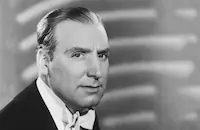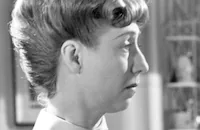An Innocent Affair

Brief Synopsis
Cast & Crew
Lloyd Bacon
Fred Macmurray
Madeleine Carroll
Chas. "buddy" Rogers
Rita Johnson
Louise Allbritton
Film Details
Technical Specs

Synopsis
Advertising executive Vincent Doane has been assigned the task of securing the account of a large perfume company run by widow Margot Fraser, who was once his fiancée. Fearing that his wife Paula will be suspicious, Vincent pretends to be having meetings with a "Mr. Fraser." Paula nevertheless is convinced that Vincent is up to something and, with the help of Vincent's sister Eve Lawrence, arranges to hire an actor to flirt with her and make Vincent jealous. However, the agent who is to supply the actor and who expects future business from Vincent's company, tips off Vincent about Paula's ploy, and he decides to play along with the game. Although the "gigolo" is supposed to be seated next to the couple during their fifth wedding anniversary celebration at the Venetian Room nightclub, millionaire tobacco tycoon Claude Kimball is instead given the table next to Vincent and Paula, both of whom assume that he is the gigolo. Paula winks at Claude then complains to Vincent that Claude is flirting with her. Vincent goes to talk with Claude, who knows nothing of the situation, and invites him to join them, much to Paula's surprise. Meanwhile, the real gigolo arrives, and when he is seated next to another couple, he begins to flirt with the woman and is attacked by her escort and ejected from the club. During the evening, Claude, a Southern gentleman, is confused by Paula's advances but accepts an invitation to join them at their apartment for a nightcap. After Vincent tells Claude that he and his wife trust each other, Claude mentions that he might consider giving Vincent's agency the seven million dollar account for his Kim Cigarette company. Vincent, still thinking of Claude as a "stooge," suggests that Claude escort Paula the next evening while he meets with Margot. On his way out, Claude receives a cash tip from Vincent and congratulations on the quality of his "impersonation." The next day, after Paula complains to Eve that the actor was not very effective, Gaylord, the real actor, who is now sporting a black eye, comes to the apartment and states that when he was hired, he was assured that Vincent was aware of the ruse. Paula and Eve are forced to pay Gaylord a damage settlement. After Paula checks and confirms Claude's identity, Eve points out that Vincent might react the way Paula originally intended when he discovers that Claude is a real millionaire. That evening, at the Rocket Roof nightclub, Vincent pitches his advertising strategies to Margot, but she is much more interested in romance. When Claude brings Paula to the same club, Vincent is desperate that Paula not see him with Margot. Although Paula spots him, she pretends not to have and leaves in a taxi with Claude, to whom she explains the whole situation. He convinces her that, to spite Vincent, she really should go out and have the time of her life. She agrees and they spend the evening in a number of nightclubs. The next morning, Vincent is very surprised to discover that his name has been added to the agency's as a result of Kim Cigarettes awarding Vincent their account. At home, a stunned Vincent tells Paula that he thought Claude was an actor she had hired, but she denies ever doing such a thing. Paula then reveals that she has seen Mr. Fraser, forcing Vincent to attempt to talk his way out of the situation. Later, when Vincent meets attorney Lester Burnley and learns that Paula intends to divorce him, he and Lester evolve a plan to save the marriage. The following day, Lester escorts Paula to the same restaurant where Vincent and Margot are having lunch. Vincent has his friend, Ken St. Clair, pose as Mr. Fraser and tells Paula that he has just closed the deal. After Paula decides not to go through with the divorce, Vincent is forced to introduce her to the Frasers. Margot spoils everything by having the muddle-headed St. Clair respond to a page at his table, giving the game away. Paula stomps out and later recommences the divorce proceedings, while Vincent, who is now thoroughly jealous of Claude, moves out of their apartment. Eve tells Vincent that Paula is leaving for Reno and suggests that he go back to her and, although innocent, lie and confess to whatever he chooses. However, when he tries to confess that he has been unfaithful with Margot, Paula does not believe him and throws him out. On her way to the train, Paula goes to Margot's office and slaps her. Margot then finds Vincent and complains about Paula's attack. After Vincent convinces her that Paula intends to name her as co-respondent and could ruin her business reputation, he and Margot head for the railroad station. When they locate Paula, Margot explains that nothing has been going on between her and Vincent, then slaps Paula. Vincent chases Paula through the train, and they finally reunite on the platform as the train pulls out.

Director

Lloyd Bacon
Cast

Fred Macmurray

Madeleine Carroll
Chas. "buddy" Rogers

Rita Johnson

Louise Allbritton

Alan Mowbray
Mike Romanoff

Pierre Watkin
William Tannen
James Seay
Matt Mchugh

Marie Blake
Susan Miller

Anne Nagel
Eddie Lebaron
Jane Weeks
Crew
Athena
Fred W. Berger
Mel Berns
Lou Breslow
Edward Cronjager
Henry Cronjager
Hugh Cummings
Clarence Eurist
Ernst Fegté
Kim Gannon
Mary Gibsone
Don Greenwood
Joseph Hoffman
Walter Kent
Madison Lacy
Helen Lierely
John Livesley
William Lynch
Jacques Mapes
James Nasser
Lewis J. Rachmil
Hans J. Salter

Videos
Movie Clip


Film Details
Technical Specs

Articles
An Innocent Affair (Don't Trust Your Husband) -
By Violet LeVoit

An Innocent Affair (Don't Trust Your Husband) -
Quotes
Trivia
Notes
After this film opened in New York as An Innocent Affair, its title was changed to Don't Trust Your Husband; it played in Los Angeles under that title in January 1949. The latter title was on the viewed print. The credited song, "Innocent Affair," was not heard in the viewed print. This film was James Nasser's first production for his own company and was Madeleine Carroll's first American film since 1942. Charles "Buddy" Rogers also returned to the screen after a six-year absence.














